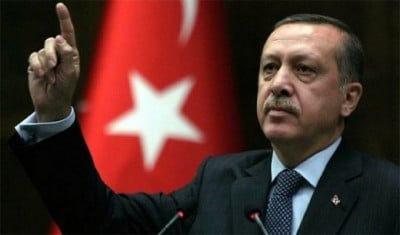Erdoğan’s Quest for a New Sharia-Based Alliance

All Global Research articles can be read in 51 languages by activating the “Translate Website” drop down menu on the top banner of our home page (Desktop version).
To receive Global Research’s Daily Newsletter (selected articles), click here.
Visit and follow us on Instagram at @crg_globalresearch.
***
U.S. President Joe Biden’s lamentable decision to unilaterally withdraw from Afghanistan is paving the way for the emergence of a new sharia-based alliance, including NATO member Turkey — theoretically a Western ally. Turkish President Recep Tayyip Erdoğan’s Islamist ambitions appear to be seeking an international role in post-U.S. Afghanistan in alliance with the Taliban, Qatar, Pakistan and Malaysia. The trouble is, Turkey, among the new sharia alliance in the making, is the only country with institutional ties to the West.
Turn now to SADAT, a Turkish military consultancy and training company, though hardly an ordinary one. There were claims that the Erdoğan government, through SADAT, sent arms shipments to Syria to help the jihadists. Critics, including opposition lawmakers, have been inquiring about SADAT’s activities, after suspecting its real mission may be to train official or unofficial paramilitary forces to fight Erdoğan’s multitude of wars, both inside Turkey and without.
SADAT is owned by retired general Adnan Tanrıverdi who was appointed in August 2016 as Erdoğan’s chief military advisor, but quit in 2020. In 1996, Tanrıverdi was forced to resign from the military due to “suspected radical Islamist activities.” In a 2009 speech, Tanrıverdi said:
“To defeat Israel, the country must be forced into defensive warfare, all of its forces must be engaged and the war must be prolonged.
“What should Turkey do? The resistance units in Gaza should be supported by anti-tank and low-altitude anti-aircraft weapons.
“Turkey, Iran, Syria, the Iraqi Resistance Organization and Palestine should form the nucleus of a defense structure. Within this context the formation of an Islamic rapid reaction force consisting of an amphibious brigade, an armored brigade and an airborne brigade should be encouraged.”
Recently, SADAT advocated the idea of Turkey supporting and helping the Taliban — a group it has called a resistance movement — to establish a sharia state in Afghanistan. A research piece published on September 13 by Ali Coşar, a retired colonel and board member of SADAT, advocated that Turkey help the new Afghanistan run by the Taliban in cooperation with Pakistan, Qatar and Malaysia.
Coşar dismisses the description that the Taliban is a terrorist organization: “They [the Taliban] are members of a resistance movement that fought against colonial America for 20 years to take over the government and establish a state that practices sharia. …” Just like Ottoman Turks who ruled conquered lands under sharia law, he reminded his listeners.
Biden has weakened himself and his country so badly that the superpower was reduced to the point of being blackmailed by NATO’s only Islamist member. Turkey’s Defense Minister Hulusi Akar has made it clear: “If the U.S. is to be in the Middle East, it must cooperate with Turkey.”
Seth J. Frantzman wrote in the Jerusalem Post in August:
“The victors in Kabul will be those who benefit from the Taliban taking power. They will also be those who benefit or cheer as the U.S. appears humiliated.
“Among those ‘winners’ are Qatar, Russia, China, Pakistan, Turkey and Iran. This can be seen in various ways. Most of these countries hosted the Taliban or tacitly backed them.”
Afghanistan is not Erdoğan’s only pro-sharia ambition after the U.S. withdrawal.
As the international community focused on the chaos unfolding in Afghanistan, Turkey ramped up its drone attacks on Yazidis in Iraq’s Sinjar district. The most recent strikes destroyed a medical clinic. Analyst Michael Rubin warned in the Washington Examiner.:
“The Turkish drone strikes increasingly threaten to undercut refugee repatriation inside Iraq and create space for the Islamic State to regroup, as the most effective Kurdish groups fighting ISIS are Sinjar’s grassroots Kurdish and Yazidi militias.”
Biden’s catastrophic miscalculation in Afghanistan will also have unwanted repercussions in Syria. In an interview with The Independent, Abu Mohammad al-Joulani, leader of the Hayat Tahrir al-Sham (HTS) terrorist group, commented on the Afghan situation: “The aftermath of the U.S. surprise withdrawal from Kabul will also have an impact on the Kurds [or, as he put it, ‘the US-backed enemies of the Syrian revolution’].”
HTS is a dominant jihadist power in the Idlib “de-escalation zone” in northern Syria. HTS has never been in direct confrontation with the Kurds. Al-Joulani’s words, however, highlighted his open hostility towards the Kurdish administration that, as he purports, is only able to control a huge swath of Syria and maintain relative stability thanks to the US support. As soon as the last U.S. plane takes off from the Syrian soil, according to al-Joulani, this Kurdish dream will crumble.
When combined in a simple analytical way, Erdoğan’s pro-sharia ambitions and the terrorist al-Joulani’s statements herald a new jihadist proxy army for Ankara fighting on Syrian soil. The unwritten deal looks too apparent: HTS fighting Turkey’s regional enemies, the Kurds and the Syrian regime, in return for tacit Turkish support for international recognition as a legitimate entity rather than as a terrorist one.
Erdoğan’s Islamist, neo-Ottoman ambitions are now taking a pro-sharia turn. That is bad news for the region to Turkey’s south and east. Worse, it is a slow-fuse time bomb for the West.
*
Note to readers: Please click the share buttons above or below. Follow us on Instagram, @crg_globalresearch. Forward this article to your email lists. Crosspost on your blog site, internet forums. etc.
Burak Bekdil, one of Turkey’s leading journalists, was recently fired from the country’s most noted newspaper after 29 years, for writing in Gatestone what is taking place in Turkey. He is a Fellow at the Middle East Forum.

